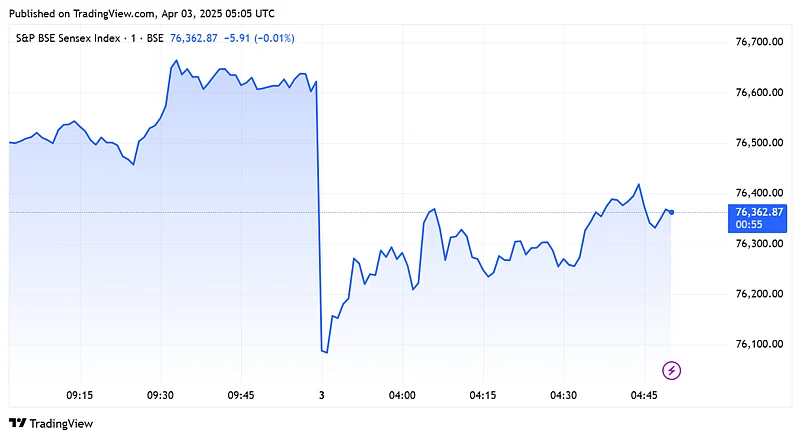Trump Tariffs: Not a good sign for investors. That's a wrap in one statement on how investors reacted to Trump's so-called discounted tariff stance. Domestic benchmark indices— Sensex and Nifty— plummeted during early trading hours. Nifty IT was the worst-performing sectoral index, dropping by nearly 1,000 points or 2.47% on April 3.
However, the Indian stock market was not the only one in pain. Hong Kong's Hang Seng index also dropped sharply by over 1.5% or 366 points and was trading around 22,800 level mark. Japan's Nikkei crashed by over 1,200 points or 3.4% after Trump announced a tariff of 24%.

President Trump has finally pulled the trigger on his so-called 'discounted' reciprocal tariffs, setting a 10% baseline across the board. China (54%) and Vietnam (46%) are taking the biggest hit, while India’s tariffs have shot up to 27%.
Ankita Pathak, macro strategist and global equities fund advisor at Ionic Asset, said the US is likely going to be open to negotiations, which could lead to market volatility ahead. Meanwhile, China has already vowed to retaliate and called the recent move “typical unilateral bullying practice."
“China firmly opposes this and will resolutely take countermeasures to safeguard its own rights and interests,” China’s Ministry of Commerce reportedly said in a statement Thursday morning.
Impact on India
Analysts believe that major sectors, including auto, machinery, textiles, pharma, agri and gems and jewellery, will continue to face heightened pressure as these industries are highly vulnerable to US tariffs. But, a big effect will be seen via indirect channels, impacting the overall risk appetite of corporates.
"A slowdown in US growth and weak global trade momentum will impact external demand. More importantly, we expect the impact to be more pronounced through the indirect channel of weaker corporate confidence, which will dent the risk appetite and further defer the capex cycle. As such, we see downside risk of 30-60bps to our growth estimate of 6.5% for F26e," Morgon Stanley said in a note.
The announced tariffs are more severe than anticipated. While the market had expected the effective tariff rate to be in the high teens, the actual rates are now projected to be in the mid-to-high 20% range – possibly the highest we have seen in a century, a significant increase from the previous 2.5–5% levels, said Arindam Mandal, head of global equities at Marcellus Investment Managers.
As for inflation, analysts suggest that subdued demand could help keep it in check and limit sharp interest rate hikes ahead. Plus, markets have already factored in some of these risks, as seen in the strong performance of defensive sectors. This trend might continue until the impact of tariffs and its spillover effect is fully priced into riskier stocks and sectors.
What investors should watch out for
For now, volatility might continue to haunt D-street until the overall impact of trade activities is fully calculated. While equity markets might respond with pessimism initially, the adjustment phase is likely to bring a more measured movement. It is also worth mentioning that other nations will also roll out counter-tariffs, deepening the overall impact over time.
Apart from China, Canada has also vowed to "fight these measures with countermeasures." This might make the already turbulent environment more uncertain.
"Going ahead, holding 22,300 (on a closing basis) which is confluence of 80% retracement of the move from election day low and all time high (21281-26277) and 100-week EMA which will act as cushion and due to the tariff, chances of profit booking for couple of sessions cannot be ruled out but should be considered as healthy retracement making a higher base," ICICI Direct said in a market note.

































